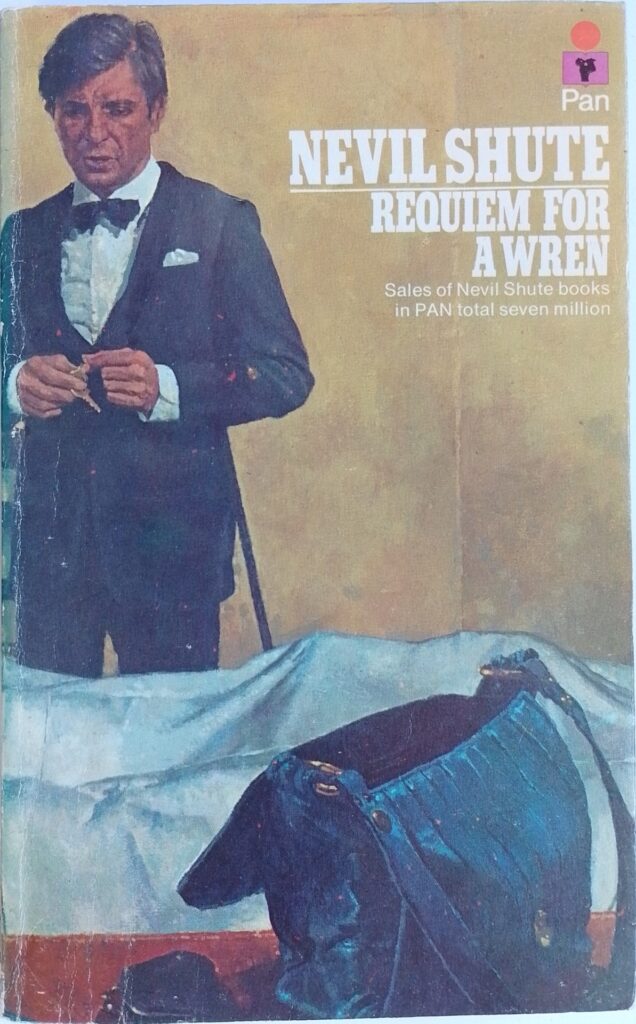First published 1955. Pan paperback, 1977, pp 253, c.92,000 words.
The title of this book suggests that its subject is a tragedy, and so it is. Alan Duncan returns from Britain to his family farm in Australia to discover that the night before his arrival the parlourmaid apparently took her own life, and no one knows why.
Duncan had served with distinction in the RAF during the second world war, and afterwards worked as a lawyer in London. Intermittently he has been trying to find what happened to his brother’s fiancé, a Wren; the brother having been killed in the war. The story goes back to the days of the war when all three were stationed on the South Coast of England ahead of D-Day.
There is much atmospheric description of the build-up of men and material ahead of the invasion. This feels completely authentic, with powerful forces being assembled through complex and detailed planning but still subject to the vagaries of human behaviour, personality clashes, mechanical breakdown, misinformation and bad weather. Women were heavily involved in non-combat support roles such as the Wren’s job as an ‘armaments artificer’, who were responsible for ensuring that guns were fully functional. Shute clearly has a lot of sympathy with the work women did and with the lower ranks generally. Senior officers are more of mixed bag, from decent old sticks to bungling bureaucrats. On the whole, Shute is excellent in realistically portraying the variety of humankind. Most have natural failings, even those apparently cast in heroic moulds.
What resonates most here is the excitement of war-time and the let-down of its aftermath. In war, the enemy is known and the aim clear, what is done is ordered for good or ill, everyone is working to achieve the same aim. There is a deep sense of purpose and the individual’s role in the scheme of things is obvious. We are part of a team. We want to win. We feel useful. Time might be short, for tomorrow we might die, which heightens feelings. Then the war ends. We are no longer needed for the cause. We have to go back to the mundane, the everyday world, where we all scrabble around to make a living, trying to do the best we can by our own lights. The excitement and team spirit has gone, and we would like it back. Shute evokes this so well, with the Wren hoping that each little skirmish or minor war will turn into something worse; then she will be needed again, and life will have purpose once more. ‘We had too good a time in the last one.’ [p188]
Instead she is left brooding on mistakes of the past, amplifying them and, in a brain-slip, somehow thinking that she is in that special place where she has to atone, and all that she loves has been, or will be, taken from her. She fails to see the immense egoism of this view: thinking that she is central to God’s purpose, as perhaps we all do to some extent, and that those she loves are mere tokens that God chooses to take away. This rather jars: it is of another time and now seems over played.
The last-page act of Duncan seems a bit tacked on, and the outcome of that bit of romanticism seemed to be highly doubtful. Life on a remote, Australian, outback sheep-station would not be for every artistic, London woman, however wealthy the farmer.
Shute writes very well. His style is articulate and fluid, making for easy reading. Philosophy and politics are glanced at but don’t bog down a good story, even if the end is mostly melancholic and tragic. The structure is complex but well-articulated, with the story starting and ending in the same place and within a short time span. Through the book there is a certain amount of hopping about between place and time, but it is confidently handled; it is never as though a thread was suddenly dropped for another, only for the first to be picked up again later, as it might have been in less skilful hands. Used very occasionally are archaic words or Australian colloquialisms such as ‘benison’, ‘chi-hiking’, ‘megrims’ and ‘scunner’, but all can be guessed at fairly readily in context. On two occasions we are told that a dog was ‘standing proudly in the bow’ [p138 and p141]: poor editing. Once he writes ‘unusually good for a woman’ [p183] which an author couldn’t get away with today. Mostly the women are treated equally in intelligence, skill and self-will as the male characters.
The Observer critic is quoted on the back cover of this edition as saying ‘His best novel since A Town Like Alice’, and for once I agree. It might even be better.
Wikipedia biography of Shute: https://en.wikipedia.org/wiki/Nevil_Shute
Wikipedia summary of the book: https://en.wikipedia.org/wiki/Requiem_for_a_Wren
Others’ reviews of the book: https://www.goodreads.com/book/show/664947.Requiem_for_a_Wren?ref=nav_sb_ss_1_18
© William John Graham, March 2023

